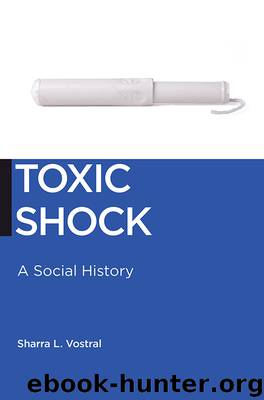Toxic Shock by Sharra L. Vostral

Author:Sharra L. Vostral
Language: eng
Format: epub
Publisher: New York University Press
5
Health Activism and the Limits of Labeling
Even after litigation, the resulting settlements to women and their families, and the withdrawal of Rely from market shelves, more was still needed to protect women from the danger associated with superabsorbent tampons. That toxic shock syndrome (TSS) could be identified by its symptoms, and that tampon-related TSS was stabilized as a legitimate illness, aided in diagnoses of patients. Women, however, wanted to be assured that they would not unintentionally die from a tampon. To reduce the problem to a “choice” between brands, as marketing so often did by equating it with freedom and equality, was misleading and unfair. Who would willingly choose to use a tampon knowing they might be dead three days later when they could have simply selected brand X, Y, or Z instead and remained alive?
Corporations could no longer act is if tampons were inert, especially because epidemiology provided clear data that TSS rates were linked to superabsorbent tampons. Short of banning tampons altogether, an immediate necessity was to warn women and tell them to use the least absorbent one possible. The Centers for Disease Control (CDC) and the Food and Drug Administration (FDA) provided this initial message, but companies would need to shoulder that responsibility if they wanted to keep selling tampons and not be held liable. The most conscientious woman following the CDC’s advice to use the least absorbent tampon in order to reduce the risk of TSS had to base her decision on marketing propaganda, the language for which was inconsistent between brands. Even the text on the sample box of Rely depended on imprecise definitions of absorbency when it boasted “if you now use the Super size of another tampon, you may find that you can completely depend on Rely Regular—it works that well!” Though this promotional material crafted these differences as beneficial, the slippery terminology was a problem. While companies made it their business to determine the absorbency rates of each and every tampon including their competitors, they withheld this information from consumers, instead offering terms such as “super” or “regular” to indicate absorbency, which were not meaningful. There was no systematic rating, ranking, or basic gram weight indicated on tampon boxes.
The politics of nondisclosure and the withholding of information are not unusual in the history of women’s health. The women’s health movement of the late 1960s and early 1970s played a large role in exposing the costs of silence, the hubris of some physicians in controlling medical treatment, and the lack of basic knowledge and information about women’s reproductive life course. In addition, feminist health advocacy organizations, such as the Boston Women’s Health Book Collective (BWHBC), worked to fill the void by reclaiming information and distributing it, most notably in the form of the book Our Bodies, Ourselves (OBOS). The collective was interested in menarche, pregnancy, menopause, birth control, abortion, and sexuality, while discussing these topics openly and promoting practices that favored women’s health. As such, it included tampon safety in its mission. Thus,
Download
This site does not store any files on its server. We only index and link to content provided by other sites. Please contact the content providers to delete copyright contents if any and email us, we'll remove relevant links or contents immediately.
Periodization Training for Sports by Tudor Bompa(8272)
Why We Sleep: Unlocking the Power of Sleep and Dreams by Matthew Walker(6725)
Paper Towns by Green John(5191)
The Immortal Life of Henrietta Lacks by Rebecca Skloot(4588)
The Sports Rules Book by Human Kinetics(4386)
Dynamic Alignment Through Imagery by Eric Franklin(4217)
ACSM's Complete Guide to Fitness & Health by ACSM(4060)
Kaplan MCAT Organic Chemistry Review: Created for MCAT 2015 (Kaplan Test Prep) by Kaplan(4012)
Livewired by David Eagleman(3772)
Introduction to Kinesiology by Shirl J. Hoffman(3769)
The Death of the Heart by Elizabeth Bowen(3621)
The River of Consciousness by Oliver Sacks(3604)
Alchemy and Alchemists by C. J. S. Thompson(3521)
Bad Pharma by Ben Goldacre(3428)
Descartes' Error by Antonio Damasio(3279)
The Emperor of All Maladies: A Biography of Cancer by Siddhartha Mukherjee(3163)
The Gene: An Intimate History by Siddhartha Mukherjee(3098)
The Fate of Rome: Climate, Disease, and the End of an Empire (The Princeton History of the Ancient World) by Kyle Harper(3067)
Kaplan MCAT Behavioral Sciences Review: Created for MCAT 2015 (Kaplan Test Prep) by Kaplan(2986)
